Australian Catholic University Debate: HCP Refusal of Treatment
VerifiedAdded on 2022/08/20
|5
|1397
|17
Report
AI Summary
This document presents a debate transcript exploring the complex ethical issue of whether healthcare professionals (HCPs) have the right to refuse treatment to patients exhibiting violent behavior. The debate features two teams, one arguing for and the other against the HCP's right to refuse treatment. The affirmative team supports the right to refuse treatment, citing utilitarianism, deontological theory, and the HCP's right to safety and dignity. The negative team opposes this, emphasizing ethical principles like non-maleficence, beneficence, human rights, the ethics of care, and the importance of communication and understanding the root causes of violent behavior. The debate considers various ethical theories, legal frameworks, and the importance of balancing patient rights with the safety and well-being of healthcare providers. References to relevant literature and legal frameworks are provided to support the arguments presented by both sides. The debate highlights the complexities of ethical decision-making in healthcare settings and the need to consider multiple perspectives when addressing sensitive issues.
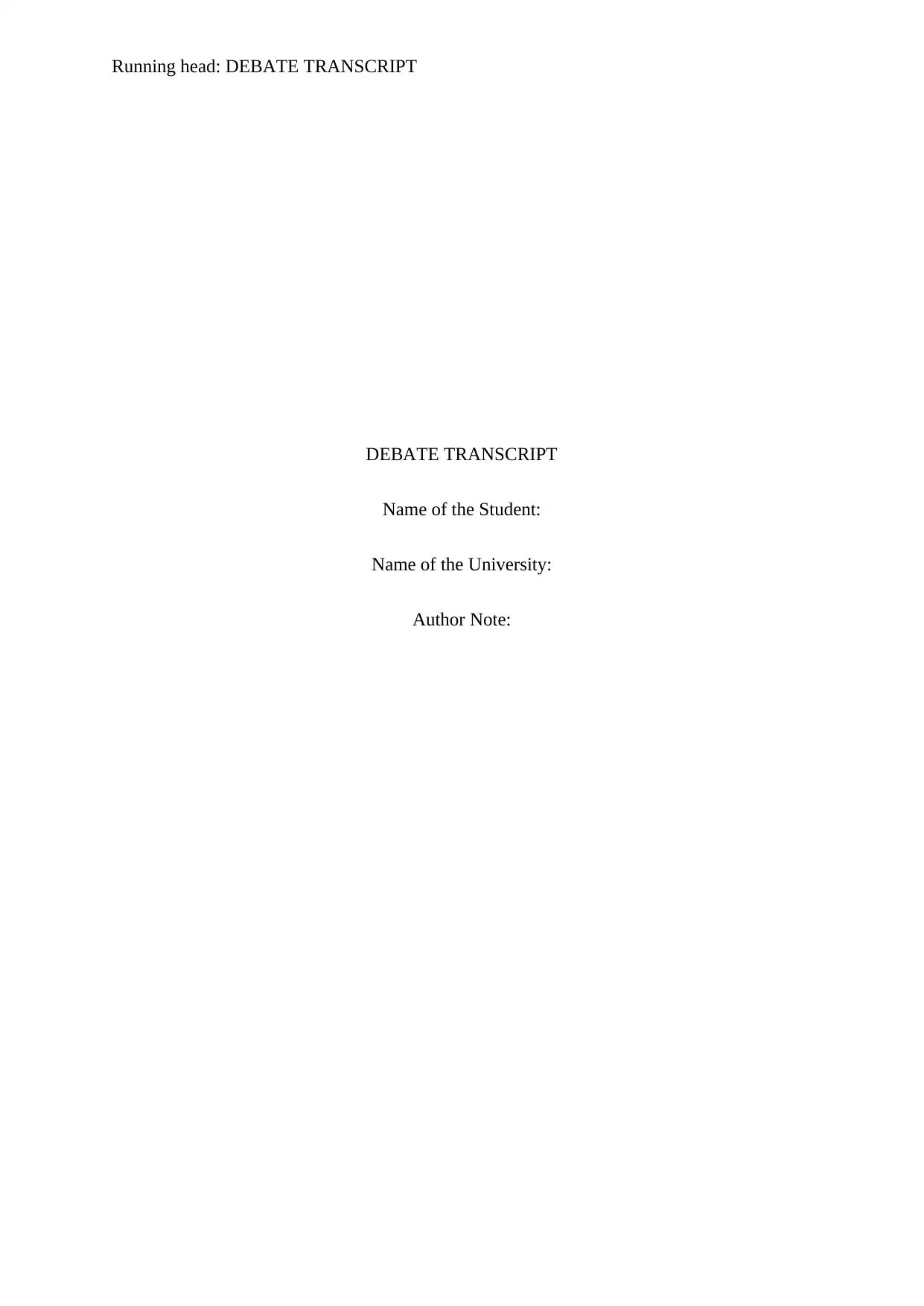
Running head: DEBATE TRANSCRIPT
DEBATE TRANSCRIPT
Name of the Student:
Name of the University:
Author Note:
DEBATE TRANSCRIPT
Name of the Student:
Name of the University:
Author Note:
Paraphrase This Document
Need a fresh take? Get an instant paraphrase of this document with our AI Paraphraser
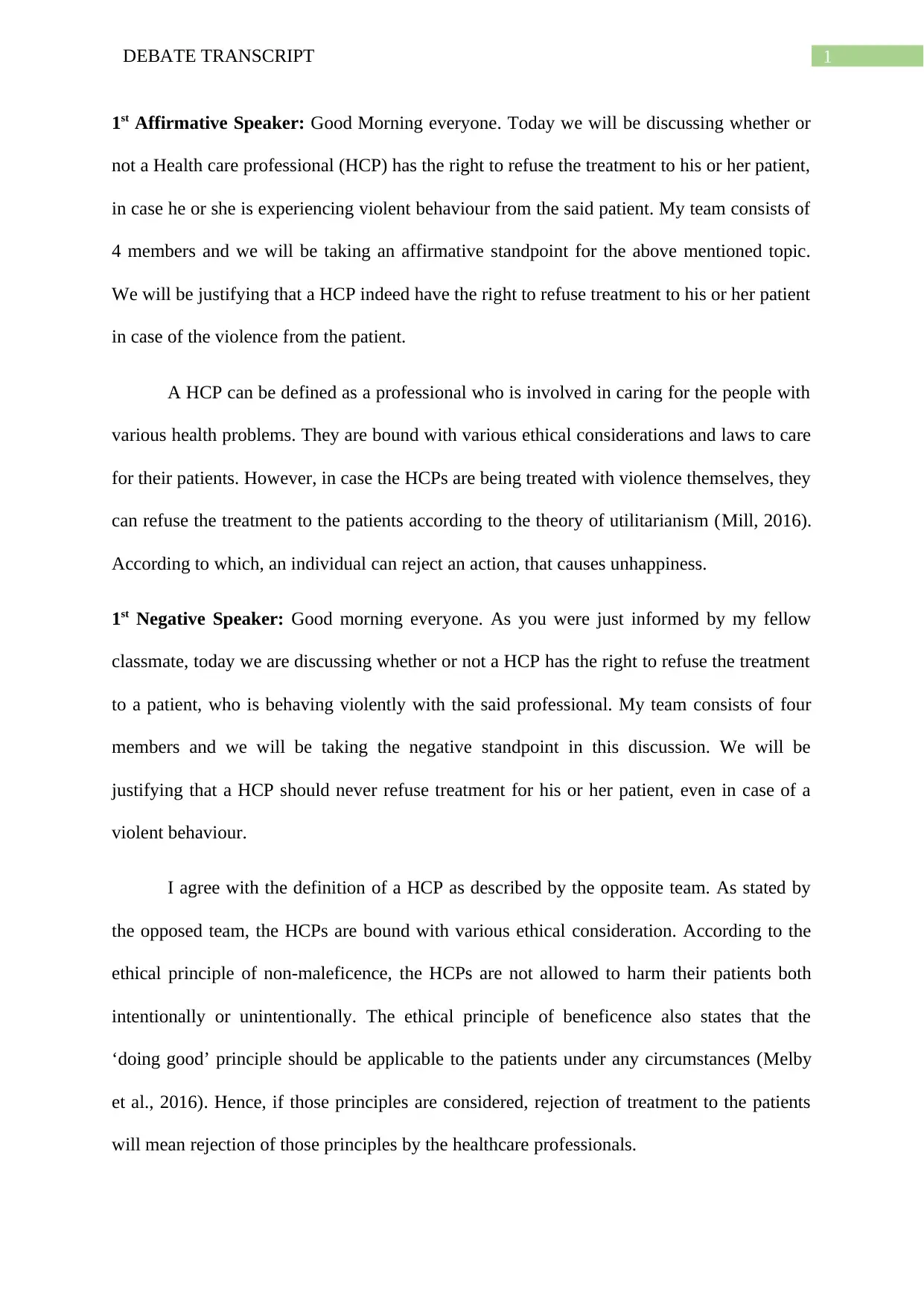
1DEBATE TRANSCRIPT
1st Affirmative Speaker: Good Morning everyone. Today we will be discussing whether or
not a Health care professional (HCP) has the right to refuse the treatment to his or her patient,
in case he or she is experiencing violent behaviour from the said patient. My team consists of
4 members and we will be taking an affirmative standpoint for the above mentioned topic.
We will be justifying that a HCP indeed have the right to refuse treatment to his or her patient
in case of the violence from the patient.
A HCP can be defined as a professional who is involved in caring for the people with
various health problems. They are bound with various ethical considerations and laws to care
for their patients. However, in case the HCPs are being treated with violence themselves, they
can refuse the treatment to the patients according to the theory of utilitarianism (Mill, 2016).
According to which, an individual can reject an action, that causes unhappiness.
1st Negative Speaker: Good morning everyone. As you were just informed by my fellow
classmate, today we are discussing whether or not a HCP has the right to refuse the treatment
to a patient, who is behaving violently with the said professional. My team consists of four
members and we will be taking the negative standpoint in this discussion. We will be
justifying that a HCP should never refuse treatment for his or her patient, even in case of a
violent behaviour.
I agree with the definition of a HCP as described by the opposite team. As stated by
the opposed team, the HCPs are bound with various ethical consideration. According to the
ethical principle of non-maleficence, the HCPs are not allowed to harm their patients both
intentionally or unintentionally. The ethical principle of beneficence also states that the
‘doing good’ principle should be applicable to the patients under any circumstances (Melby
et al., 2016). Hence, if those principles are considered, rejection of treatment to the patients
will mean rejection of those principles by the healthcare professionals.
1st Affirmative Speaker: Good Morning everyone. Today we will be discussing whether or
not a Health care professional (HCP) has the right to refuse the treatment to his or her patient,
in case he or she is experiencing violent behaviour from the said patient. My team consists of
4 members and we will be taking an affirmative standpoint for the above mentioned topic.
We will be justifying that a HCP indeed have the right to refuse treatment to his or her patient
in case of the violence from the patient.
A HCP can be defined as a professional who is involved in caring for the people with
various health problems. They are bound with various ethical considerations and laws to care
for their patients. However, in case the HCPs are being treated with violence themselves, they
can refuse the treatment to the patients according to the theory of utilitarianism (Mill, 2016).
According to which, an individual can reject an action, that causes unhappiness.
1st Negative Speaker: Good morning everyone. As you were just informed by my fellow
classmate, today we are discussing whether or not a HCP has the right to refuse the treatment
to a patient, who is behaving violently with the said professional. My team consists of four
members and we will be taking the negative standpoint in this discussion. We will be
justifying that a HCP should never refuse treatment for his or her patient, even in case of a
violent behaviour.
I agree with the definition of a HCP as described by the opposite team. As stated by
the opposed team, the HCPs are bound with various ethical consideration. According to the
ethical principle of non-maleficence, the HCPs are not allowed to harm their patients both
intentionally or unintentionally. The ethical principle of beneficence also states that the
‘doing good’ principle should be applicable to the patients under any circumstances (Melby
et al., 2016). Hence, if those principles are considered, rejection of treatment to the patients
will mean rejection of those principles by the healthcare professionals.
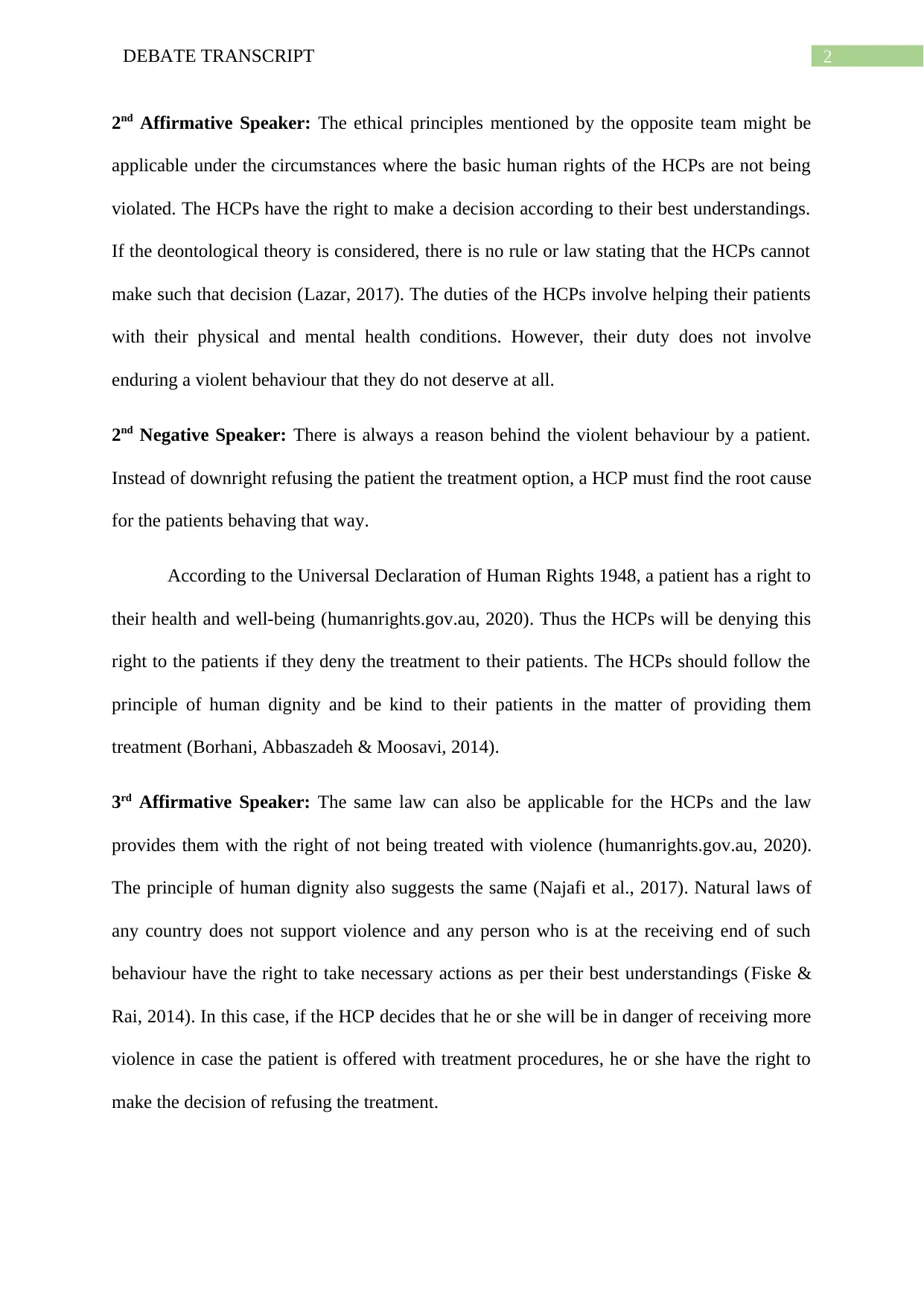
2DEBATE TRANSCRIPT
2nd Affirmative Speaker: The ethical principles mentioned by the opposite team might be
applicable under the circumstances where the basic human rights of the HCPs are not being
violated. The HCPs have the right to make a decision according to their best understandings.
If the deontological theory is considered, there is no rule or law stating that the HCPs cannot
make such that decision (Lazar, 2017). The duties of the HCPs involve helping their patients
with their physical and mental health conditions. However, their duty does not involve
enduring a violent behaviour that they do not deserve at all.
2nd Negative Speaker: There is always a reason behind the violent behaviour by a patient.
Instead of downright refusing the patient the treatment option, a HCP must find the root cause
for the patients behaving that way.
According to the Universal Declaration of Human Rights 1948, a patient has a right to
their health and well-being (humanrights.gov.au, 2020). Thus the HCPs will be denying this
right to the patients if they deny the treatment to their patients. The HCPs should follow the
principle of human dignity and be kind to their patients in the matter of providing them
treatment (Borhani, Abbaszadeh & Moosavi, 2014).
3rd Affirmative Speaker: The same law can also be applicable for the HCPs and the law
provides them with the right of not being treated with violence (humanrights.gov.au, 2020).
The principle of human dignity also suggests the same (Najafi et al., 2017). Natural laws of
any country does not support violence and any person who is at the receiving end of such
behaviour have the right to take necessary actions as per their best understandings (Fiske &
Rai, 2014). In this case, if the HCP decides that he or she will be in danger of receiving more
violence in case the patient is offered with treatment procedures, he or she have the right to
make the decision of refusing the treatment.
2nd Affirmative Speaker: The ethical principles mentioned by the opposite team might be
applicable under the circumstances where the basic human rights of the HCPs are not being
violated. The HCPs have the right to make a decision according to their best understandings.
If the deontological theory is considered, there is no rule or law stating that the HCPs cannot
make such that decision (Lazar, 2017). The duties of the HCPs involve helping their patients
with their physical and mental health conditions. However, their duty does not involve
enduring a violent behaviour that they do not deserve at all.
2nd Negative Speaker: There is always a reason behind the violent behaviour by a patient.
Instead of downright refusing the patient the treatment option, a HCP must find the root cause
for the patients behaving that way.
According to the Universal Declaration of Human Rights 1948, a patient has a right to
their health and well-being (humanrights.gov.au, 2020). Thus the HCPs will be denying this
right to the patients if they deny the treatment to their patients. The HCPs should follow the
principle of human dignity and be kind to their patients in the matter of providing them
treatment (Borhani, Abbaszadeh & Moosavi, 2014).
3rd Affirmative Speaker: The same law can also be applicable for the HCPs and the law
provides them with the right of not being treated with violence (humanrights.gov.au, 2020).
The principle of human dignity also suggests the same (Najafi et al., 2017). Natural laws of
any country does not support violence and any person who is at the receiving end of such
behaviour have the right to take necessary actions as per their best understandings (Fiske &
Rai, 2014). In this case, if the HCP decides that he or she will be in danger of receiving more
violence in case the patient is offered with treatment procedures, he or she have the right to
make the decision of refusing the treatment.
⊘ This is a preview!⊘
Do you want full access?
Subscribe today to unlock all pages.

Trusted by 1+ million students worldwide
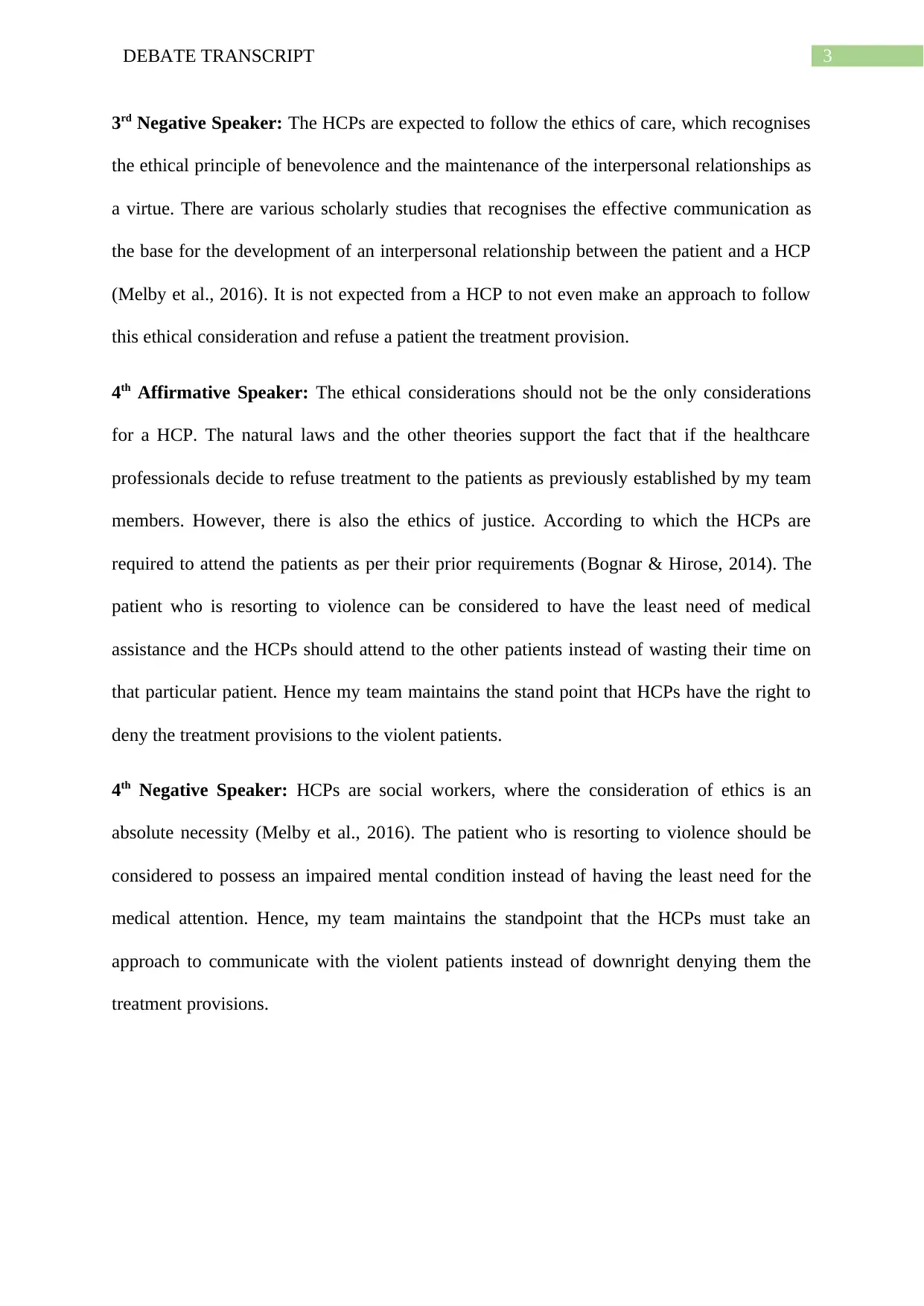
3DEBATE TRANSCRIPT
3rd Negative Speaker: The HCPs are expected to follow the ethics of care, which recognises
the ethical principle of benevolence and the maintenance of the interpersonal relationships as
a virtue. There are various scholarly studies that recognises the effective communication as
the base for the development of an interpersonal relationship between the patient and a HCP
(Melby et al., 2016). It is not expected from a HCP to not even make an approach to follow
this ethical consideration and refuse a patient the treatment provision.
4th Affirmative Speaker: The ethical considerations should not be the only considerations
for a HCP. The natural laws and the other theories support the fact that if the healthcare
professionals decide to refuse treatment to the patients as previously established by my team
members. However, there is also the ethics of justice. According to which the HCPs are
required to attend the patients as per their prior requirements (Bognar & Hirose, 2014). The
patient who is resorting to violence can be considered to have the least need of medical
assistance and the HCPs should attend to the other patients instead of wasting their time on
that particular patient. Hence my team maintains the stand point that HCPs have the right to
deny the treatment provisions to the violent patients.
4th Negative Speaker: HCPs are social workers, where the consideration of ethics is an
absolute necessity (Melby et al., 2016). The patient who is resorting to violence should be
considered to possess an impaired mental condition instead of having the least need for the
medical attention. Hence, my team maintains the standpoint that the HCPs must take an
approach to communicate with the violent patients instead of downright denying them the
treatment provisions.
3rd Negative Speaker: The HCPs are expected to follow the ethics of care, which recognises
the ethical principle of benevolence and the maintenance of the interpersonal relationships as
a virtue. There are various scholarly studies that recognises the effective communication as
the base for the development of an interpersonal relationship between the patient and a HCP
(Melby et al., 2016). It is not expected from a HCP to not even make an approach to follow
this ethical consideration and refuse a patient the treatment provision.
4th Affirmative Speaker: The ethical considerations should not be the only considerations
for a HCP. The natural laws and the other theories support the fact that if the healthcare
professionals decide to refuse treatment to the patients as previously established by my team
members. However, there is also the ethics of justice. According to which the HCPs are
required to attend the patients as per their prior requirements (Bognar & Hirose, 2014). The
patient who is resorting to violence can be considered to have the least need of medical
assistance and the HCPs should attend to the other patients instead of wasting their time on
that particular patient. Hence my team maintains the stand point that HCPs have the right to
deny the treatment provisions to the violent patients.
4th Negative Speaker: HCPs are social workers, where the consideration of ethics is an
absolute necessity (Melby et al., 2016). The patient who is resorting to violence should be
considered to possess an impaired mental condition instead of having the least need for the
medical attention. Hence, my team maintains the standpoint that the HCPs must take an
approach to communicate with the violent patients instead of downright denying them the
treatment provisions.
Paraphrase This Document
Need a fresh take? Get an instant paraphrase of this document with our AI Paraphraser
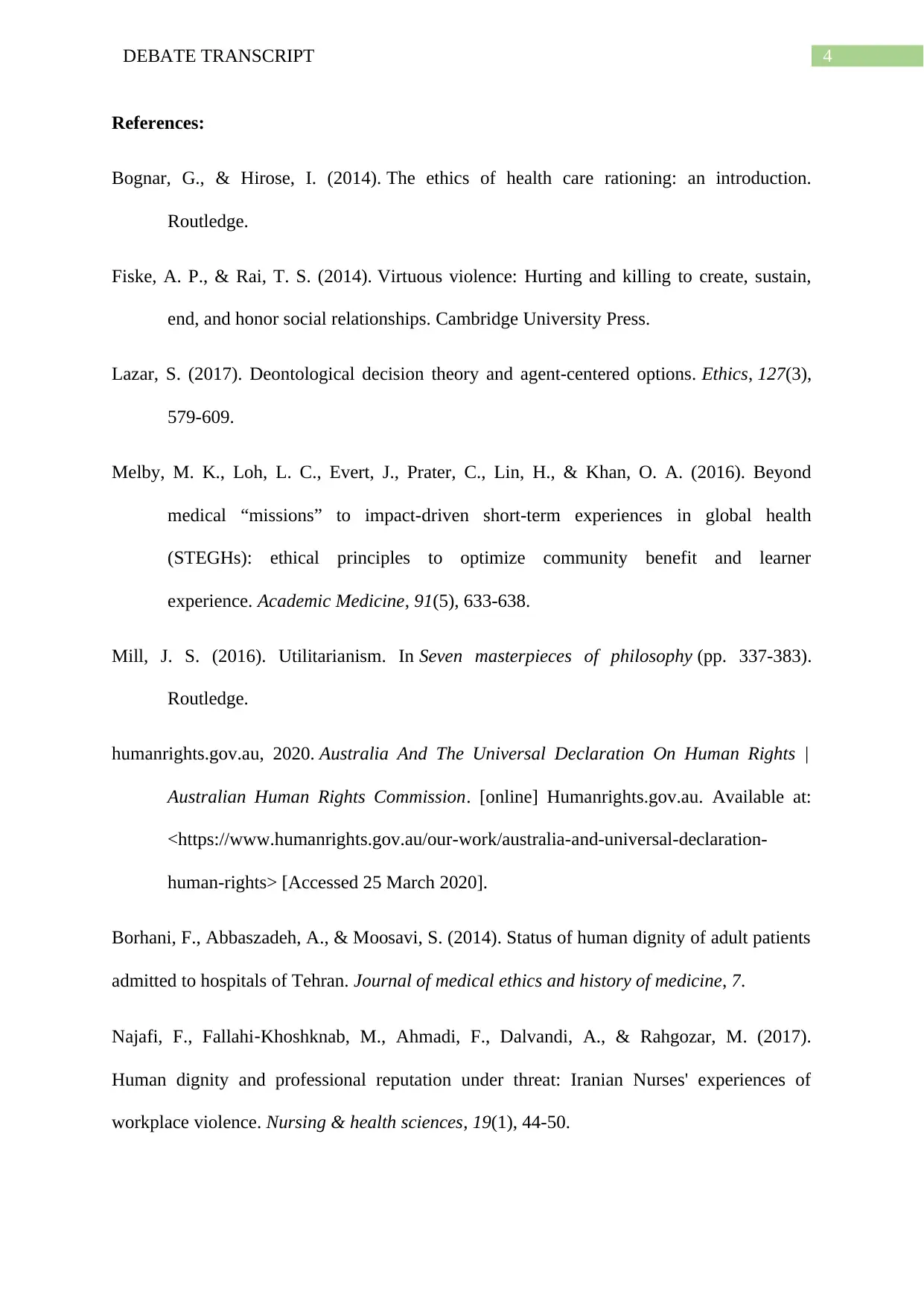
4DEBATE TRANSCRIPT
References:
Bognar, G., & Hirose, I. (2014). The ethics of health care rationing: an introduction.
Routledge.
Fiske, A. P., & Rai, T. S. (2014). Virtuous violence: Hurting and killing to create, sustain,
end, and honor social relationships. Cambridge University Press.
Lazar, S. (2017). Deontological decision theory and agent-centered options. Ethics, 127(3),
579-609.
Melby, M. K., Loh, L. C., Evert, J., Prater, C., Lin, H., & Khan, O. A. (2016). Beyond
medical “missions” to impact-driven short-term experiences in global health
(STEGHs): ethical principles to optimize community benefit and learner
experience. Academic Medicine, 91(5), 633-638.
Mill, J. S. (2016). Utilitarianism. In Seven masterpieces of philosophy (pp. 337-383).
Routledge.
humanrights.gov.au, 2020. Australia And The Universal Declaration On Human Rights |
Australian Human Rights Commission. [online] Humanrights.gov.au. Available at:
<https://www.humanrights.gov.au/our-work/australia-and-universal-declaration-
human-rights> [Accessed 25 March 2020].
Borhani, F., Abbaszadeh, A., & Moosavi, S. (2014). Status of human dignity of adult patients
admitted to hospitals of Tehran. Journal of medical ethics and history of medicine, 7.
Najafi, F., Fallahi‐Khoshknab, M., Ahmadi, F., Dalvandi, A., & Rahgozar, M. (2017).
Human dignity and professional reputation under threat: Iranian Nurses' experiences of
workplace violence. Nursing & health sciences, 19(1), 44-50.
References:
Bognar, G., & Hirose, I. (2014). The ethics of health care rationing: an introduction.
Routledge.
Fiske, A. P., & Rai, T. S. (2014). Virtuous violence: Hurting and killing to create, sustain,
end, and honor social relationships. Cambridge University Press.
Lazar, S. (2017). Deontological decision theory and agent-centered options. Ethics, 127(3),
579-609.
Melby, M. K., Loh, L. C., Evert, J., Prater, C., Lin, H., & Khan, O. A. (2016). Beyond
medical “missions” to impact-driven short-term experiences in global health
(STEGHs): ethical principles to optimize community benefit and learner
experience. Academic Medicine, 91(5), 633-638.
Mill, J. S. (2016). Utilitarianism. In Seven masterpieces of philosophy (pp. 337-383).
Routledge.
humanrights.gov.au, 2020. Australia And The Universal Declaration On Human Rights |
Australian Human Rights Commission. [online] Humanrights.gov.au. Available at:
<https://www.humanrights.gov.au/our-work/australia-and-universal-declaration-
human-rights> [Accessed 25 March 2020].
Borhani, F., Abbaszadeh, A., & Moosavi, S. (2014). Status of human dignity of adult patients
admitted to hospitals of Tehran. Journal of medical ethics and history of medicine, 7.
Najafi, F., Fallahi‐Khoshknab, M., Ahmadi, F., Dalvandi, A., & Rahgozar, M. (2017).
Human dignity and professional reputation under threat: Iranian Nurses' experiences of
workplace violence. Nursing & health sciences, 19(1), 44-50.
1 out of 5
Your All-in-One AI-Powered Toolkit for Academic Success.
+13062052269
info@desklib.com
Available 24*7 on WhatsApp / Email
![[object Object]](/_next/static/media/star-bottom.7253800d.svg)
Unlock your academic potential
Copyright © 2020–2026 A2Z Services. All Rights Reserved. Developed and managed by ZUCOL.
